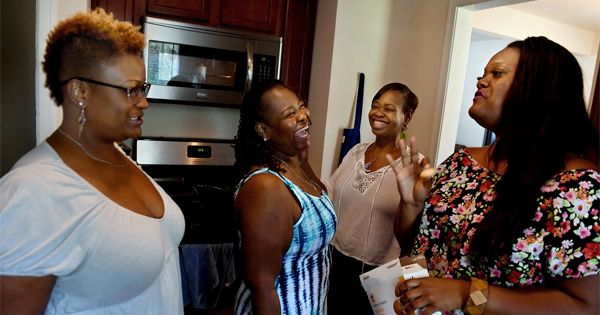Advertisement
Nicole, LaWanda, Candice, and Kasi Fearrington – ranging from 27 to 41 years of age – have always been more than willing to share everything with each other. “There isn’t anything we keep from one another. We are best friends,” Nicole says of her relationship with her sisters.
There is, however, just one aspect of their sisterhood that all four women hate sharing.
All four sisters inherited familial dilated cardiomyopathy from their father, who passed away in 2003 because of this condition.
People afflicted with familial dilated cardiomyopathy have enlarged ventricles – the lower chambers of the heart – that are weak and cannot properly pump blood through their bodies. If this condition isn’t treated, it can lead to heart failure and death.
Two of the sisters, Nicole and LaWanda, have both already had heart transplant surgeries to handle their condition. Candice and Kasi, however, have been fortunate enough to have their conditions remain stable with just the use of medication.
This heart condition requires permanent treatment – whether through checkups or medication – but all four sisters agree that their sharing this condition has brought them closer. “We are able to share the experiences we have with this disease, and coddle each other when one of us isn’t feeling well. We share laughter, and spiritual guidance. We keep each other going,” Candice says.
Although all four sisters have now found stability with their medical conditions, they continue to worry for their children and their two other sisters. Thus far, the two remaining Fearrrington sisters have shown no symptoms of this heart condition. There is, however, a 50-50 chance that someone with familial dilated cardiomyopathy can pass down the mutant gene that causes this disorder to their children.
Familial dilated cardiomyopathy is a heart condition that has yet to be thoroughly researched, in part because it has such an unusual pattern of occurrence, even among individuals who have the mutant gene in their genetic code. According to the National Library of Medicine, a person could spontaneously have this genetic mutation without having received it from a family member and develop this heart condition. At the same time, others can have the genetic mutation but not become afflicted with the disease.
All of the Fearrington sisters are hopeful that medical advancement and research will help their sisters and their children handle the potential threat of familial dilated cardiomyopathy far more easily than did Nicole and LaWanda.




